Posted by admin …
January 2018 Tablehopping
START THE YEAR MILK FREE
As I have been studying diet and nutrition over these last months I have encountered multiple controversies….How much protein should you eat?…How many carbs are good for you? How many and what types of supplements should you take? What constitutes the right amount of protein versus carbs or fats for your diet? The one thing that unfortunately has become clear..the one thing that the disparate experts can agree on is that we are taking in too much dairy. I say unfortunately because dairy is big business in central new york and I really don’t want to spearhead this message. I am not by nature a controversy guy. I am not by nature a guy that needs attention except from my wife. But the message about dairy is so clear and compelling I must bring this to your attention. To not bring this to your attention would be wrong.
Remember now that I am a regular primary care doctor…I am not a chiropractor. I am not a naturopath. I am not a complimentary doctor. I don’t operate at the fringes of medicine. But I do have time to do basic nutritional research and as your doctor will admit we got precious little exposure to nutrition in medical school. Unfortunately this is still true today. I know I am not going to make any friends with this information but you have to know what I know.
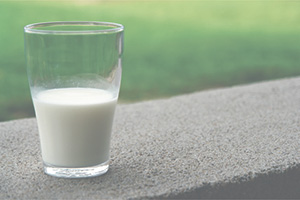 Milk can be a lifesaving source of nutrition if you are malnourished. Milk is packed with minerals and proteins and good fats . That doesn’t change the fact that cows milk is for baby cows. Let me quote Dr Frank Oski former Director of Pediatrics of Johns Hopkins University..”There is no reason to drink cows milk at anytime in your life. It is designed for calves not humans and we should all stop drinking it today”. Dr T Colin Campbell from Cornell University…Dr Gundry, Dr John Mcdougall, Dr Breseden, Dr Klepper, Dr Gregor….these are all big names in the nutrition field…they disagree on many nutritional points …but all of them believe we should stop dairy.
Milk can be a lifesaving source of nutrition if you are malnourished. Milk is packed with minerals and proteins and good fats . That doesn’t change the fact that cows milk is for baby cows. Let me quote Dr Frank Oski former Director of Pediatrics of Johns Hopkins University..”There is no reason to drink cows milk at anytime in your life. It is designed for calves not humans and we should all stop drinking it today”. Dr T Colin Campbell from Cornell University…Dr Gundry, Dr John Mcdougall, Dr Breseden, Dr Klepper, Dr Gregor….these are all big names in the nutrition field…they disagree on many nutritional points …but all of them believe we should stop dairy.
First….cow’s milk is not human breast milk…it contains lots of proteins…too many proteins designed to make a baby cow grow…these same proteins cause inflammatory responses in the body that contribute to type one diabetes, arthritis, a host of bowel problems etc. That’s right…giving babies cow milk can cause an inflammatory response that causes type one diabetes. Why believe me? What do the “real ‘ experts say? “Early exposure of infants to cow’s milk protein may be an important factor in the initiation of the beta cell destructive process in some individuals.” and “The avoidance of cow’s milk protein for the first several months of life may reduce the later development of IDDM or delay its onset in susceptible people.” (The American Academy of Pediatrics Work Group on Cow’s Milk Protein and Diabetes Mellitus – 1994).
Second is that there is a lot in cow’s milk besides water ,minerals, protein and fat. Milk contains a lot of pus ( that’s white cells )…hundreds of thousands o f pus cells per milliliter of milk. Also in milk are bacterial cells, traces of pesticides, contaminants like blood and feces, antibiotics, and hormones..lots of hormones. These are not removed by pasteurization.
 Third it’s the presence of these hormones that accelerate growth ..they are designed to accelerate growth in calves….they are not designed for humans…and may accelerate the growth of cancer. There has been a strong link between milk consumption and prostate cancer And this could be related to either all the estrogen in the milk ( which may account for the feminization of America) or the presence of Insulin LIke Growth Factor. Some people feel ILGF is a major promoter of cancer growth. You know I believe insulin is an anti longevity agent. The more insulin in your blood the less healthy you are. The more insulin in your body the fatter you are. The more insulin in your body the more likely that cancer is promoted. So why would you drink milk if it contains some insulin like protein?
Third it’s the presence of these hormones that accelerate growth ..they are designed to accelerate growth in calves….they are not designed for humans…and may accelerate the growth of cancer. There has been a strong link between milk consumption and prostate cancer And this could be related to either all the estrogen in the milk ( which may account for the feminization of America) or the presence of Insulin LIke Growth Factor. Some people feel ILGF is a major promoter of cancer growth. You know I believe insulin is an anti longevity agent. The more insulin in your blood the less healthy you are. The more insulin in your body the fatter you are. The more insulin in your body the more likely that cancer is promoted. So why would you drink milk if it contains some insulin like protein?
Fourth is that milk absolutely does not make strong bones. When the dairy industry started advertising that “milk makes strong bones” the Federal Trade Commission asked the USDA to review the facts and they found that milk does NOT make strong bones…furthermore the independent panel found that milk might contribute to heart disease, no improvement in sports performance, possible prostate cancer link, multiple gastric issues etc. The countries in the world with the highest milk production have the highest fracture rates.
Fifth is the issue of Bovine Leukemia Virus and Bovine Immunodeficiency Virus…that’s right cow AIDS …Remember mad cow disease? The USDA found in 2007 that 80% of herds had the BLV infection and antibodies to the infection were routinely found in the milk. Some cows had both infections at the same time. How can drinking milk from a sick cow be good for you.
So there are a host of reasons to avoid milk and there are plenty of alternatives. Almond milk, and coconut milk to name two…avoid soy milk..it’s too proceeded and contains too much estrogen. My advice is to avoid all milks altogether. “What do I put on my cereal ? “ I am often asked….my answer is simple…avoid cereal as well…It’s all processed sugar….all of it. You have heard me say many times if you really want to get healthy skip breakfast altogether. It is absolutely NOT the most important meal of the day.
Taking soda machines out of the schools was a good idea…the next step is removing milk as well. It’s not good for kids either. Water, precious clean water that you take for granted should be your fluid of choice.
Well, I want to discourage Americans from drinking milk but I don’t want to hurt the dairy industry. Of course I have an answer to this problem…export the milk to other countries. Milk might be completely unnecessary in America where we have a cornucopia of nutritional choices but would be a lifesaver in developing countries where diarrhea and malnourishment are very serious health concerns. Exporting the milk would help the Dairy Industry, would help the trade deficit, and would benefit the health of the malnourished worldwide. Maybe we start with North Korea….wouldn’t that be great if we could break the North Korean crisis with humanitarian aid in the form of milk? Someone tweet President Trump ! That’s how I roll ..win win..win.. Until next month….get well …stay well – Joseph Barry MD.
Give Me A Break
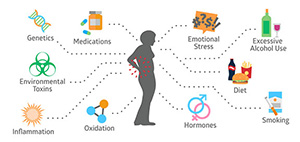 Osteoporosis is big business in America and rightfully so. Falls with fractures are a leading cause of disability and death. Osteoporosis means Òporous bone. Ó Viewed under a microscope, healthy bone looks like a honeycomb. When osteoporosis occurs, the holes and spaces in the honeycomb are much larger than in healthy bone. Osteoporosis is responsible for two million broken bones and $19 billion in related costs every year. By 2025, experts predict that osteoporosis will be responsible for approximately three million fractures and $25.3 billion in costs annually. Many different underlying conditions cause osteoporosis but the biggest risk factor is advancing age. There are obvious differences in the prevalence of osteoporosis between men and women and different ethnic groups. Asians appear more susceptible than white people who appear more susceptible than black people. Obviously women have a lot more trouble with osteoporosis than men. Osteoporosis is an issue in some very old men but most very old women.
Osteoporosis is big business in America and rightfully so. Falls with fractures are a leading cause of disability and death. Osteoporosis means Òporous bone. Ó Viewed under a microscope, healthy bone looks like a honeycomb. When osteoporosis occurs, the holes and spaces in the honeycomb are much larger than in healthy bone. Osteoporosis is responsible for two million broken bones and $19 billion in related costs every year. By 2025, experts predict that osteoporosis will be responsible for approximately three million fractures and $25.3 billion in costs annually. Many different underlying conditions cause osteoporosis but the biggest risk factor is advancing age. There are obvious differences in the prevalence of osteoporosis between men and women and different ethnic groups. Asians appear more susceptible than white people who appear more susceptible than black people. Obviously women have a lot more trouble with osteoporosis than men. Osteoporosis is an issue in some very old men but most very old women.
Along the unfortunate causes of osteoporosis are prescription and nonprescription drugs including things like heparin, lithium, methotrexate, anti seizure medicines like Dilantin and phenobarbital, selective serotonin reuptake inhibitors such as Lexapro, Prozac, and Zoloft Proton, pump inhibitors such as Nexium and Prevacid and Prilosec. Also, thyroid hormones in excess and aluminum containing antacids to name a few. Also autoimmune disorders, rheumatoid arthritis, lupus, ankylosing spondylitis and multiple sclerosis of all been associated with osteoporosis. Likewise celiac disease and weight loss surgery have been associated with osteoporosis as well as leukemia, lymphoma, multiple myeloma and sickle cell disease.
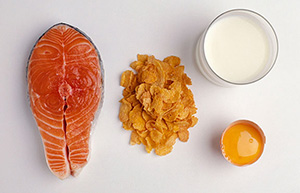 Rounding off the list of diseases that can cause osteoporosis include diabetes, hyperparathyroidism, hyperthyroidism, and cushingÕs syndrome. Also to blame are menopause and low level of testosterone and estrogen. Strokes, ParkinsonÕs disease, spinal cord injury and multiple sclerosis as well as depression and eating disorders are also associated with osteoporosis. Finally, chronic obstructive lung disease, chronic kidney disease, organ transplants, post polio syndrome, poor diet and weight loss have also been associated with osteoporosis. Smoking probably is a risk factor for osteoporosis as well.
Rounding off the list of diseases that can cause osteoporosis include diabetes, hyperparathyroidism, hyperthyroidism, and cushingÕs syndrome. Also to blame are menopause and low level of testosterone and estrogen. Strokes, ParkinsonÕs disease, spinal cord injury and multiple sclerosis as well as depression and eating disorders are also associated with osteoporosis. Finally, chronic obstructive lung disease, chronic kidney disease, organ transplants, post polio syndrome, poor diet and weight loss have also been associated with osteoporosis. Smoking probably is a risk factor for osteoporosis as well.
Now you go to the doctor and have an x-ray done that shows osteoporosis. This is the classic way of evaluating people. You could have an x-ray of your ankle but the best scan to do is the scan the places where the important fractures occur. Dexa scans (the low dose x-ray test to evaluate for osteoporosis) are the ones that I prefer to do because this is where the action is. No one suffers long from a fractured ankle, not the same way people do with a fractured back or broken hip. Since the dangerous fractures occur in the back and in the hip thatÕs where the testing should be done. ItÕs an easy, fast and painless test usually covered by insurance.
Now once the doctor establishes a diagnosis of osteoporosis you have options and most of the time that includes taking a bisphosphonate like Fosamax, Actonel, Boniva, or Reclast. You can also use different classes of drugs like Evista or Prolia to treat osteoporosis. Weight bearing exercises can increase bone density and should always be recommended.
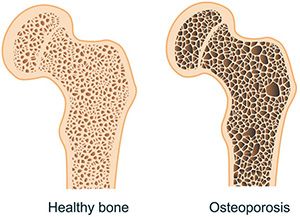 So there are some high tech drugs that are available to treat thinning bones. Most gynecologists and primary care doctors recommend calcium and vitamin D supplements but the evidence behind this recommendation is very poor and calcium supplementation in particular has not been shown to affect bone health. Go ahead and google it. I wrote to the gynecologist down the street about why he was still recommending calcium supplements and I sent them several articles that addressed the issue but I am still waiting for a response. I regret that doctors today donÕt have the time and inclination to educate each other É Its what we used to do before we were so busy filling out those insurance forms or trying to work with the electronic medical records.
So there are some high tech drugs that are available to treat thinning bones. Most gynecologists and primary care doctors recommend calcium and vitamin D supplements but the evidence behind this recommendation is very poor and calcium supplementation in particular has not been shown to affect bone health. Go ahead and google it. I wrote to the gynecologist down the street about why he was still recommending calcium supplements and I sent them several articles that addressed the issue but I am still waiting for a response. I regret that doctors today donÕt have the time and inclination to educate each other É Its what we used to do before we were so busy filling out those insurance forms or trying to work with the electronic medical records.
I think before you take any prescription meds you would do well to look to the supplements that affect bone health É namely vitamin D and vitamin K2. You have heard of vitamin K but youÕre usually thinking of vitamin K1 (phylloquinone), which is found in plants with leafy greens etc. whereas vitamin K2 ( menaquinone ) is found in animal fats and fermented foods but also found in eggs and cheese. I donÕt think many people know about vitamin K2. The main function of vitamin K2 is to modify proteins to give them the ability to bind calcium. Multiple studies in vitamin K2 have shown improvements in bone related mineral density. Several of these trials also reported fractures and found that vitamin K2 reduce spinal fractures and hip fractures and all non spinal fractures by a greater amount than any of the other drugs listed above. Vitamin K2 is also produced by bacteria in the large intestine and there is some evidence that repeated antibiotic use can contribute to Vitamin K2 deficiency. Luckily you can buy Vitamin K2 at the drugstore. The U.S. Food and Drug Administration (FDA) has not approved any form of vitamin K for the prevention or treatment of osteoporosis. There simply havenÕt been enough trials to inform our recommendations.
I would If I had osteoporosis or osteopenia ( a milder form of osteoporosis É call it osteo lite! or pre – osteo ) Regarding vitamin D deficiency; it is rampant. It is very hard to take too much vitamin D despite it being fat-soluble. We see literally hundreds and hundreds of patients with vitamin D deficiency and I have seen no-one with vitamin D toxicity in many years and we check Vitamin D on everyone! I usually recommend at least 5000 international units of vitamin D3. From the Medical Dictionary ÒVitamin D3 is synthesised in the skin after exposure to ultraviolet light; ( sunlight) in contrast, vitamin D2 is obtained only from the diet. Both vitamins D2 and D3 are metabolised to 25-hydroxyvitamin D in the liver, and then to the active 1.25 dihydroxy form in the kidney. Vitamin D has a major role in the intestinal absorption of calcium, bone calcium balance and renal excretion of calcium. Ó So just being exposed to a lot of sunshine is not sufficient alone to get a therapeutic vitamin D level. Treating vitamin D deficiency should be your first response if you have been told you are osteopenic or osteoporotic. Finally a word on calcium supplements. Calcium is important for bone health but taking calcium supplements has not been proven to be beneficial. I know I get a lot of flak from the gynecologists when I bring this up but trial after trial has failed to demonstrate that calcium supplementation in the form of calcium carbonate etc. has been significantly beneficial to bones. I tell my patients get your calcium from food É broccoli, canned salmon, oranges, almonds etc. not from tablets/pills.
Finally this is holiday time after all É This is the season to get out and enjoy events with friends and family. Why not try the sleigh ride at Highland Forest or try ice skating downtown? I want you to consider two other events. The first is the Solstice at the Cathedral. This event is December 7th-9th at St PaulÕs Cathedral downtown. As taken from their website É ÒSolstice at the CathedralÓ is a musical experience celebrating the Winter Solstice Ð the return of light after the longest night of the year. This special concert features secular music from some of Central New YorkÕs most critically acclaimed performing artists. Collaborations include a mix of pop, jazz, blues, Celtic, and original compositions combined with creative lighting and a state-of-the art sound system to enhance the overall experience. Ó Also that same weekend is the Desantis orchestra doing Christmas at the Palace Theatre on Sunday Dec 10th. This is a great show of traditional Christmas music done by local talent young and old alike. You will hear prominent singers and musicians and be introduced to some rising starÕs at a traditional Christmas setting and what a great way to start the month of December. Next year we will continue to challenge you about your health. Until then É get well and stay well. Happy Holidays. Joe Barry MD
Stop Bellyaching ! | November 2017
 I’m guilty. Guilty as charged. I’ve been guilty for almost 30 years. Guilty of prescribing what I thought was an innocuous medication that now I think is so dangerous I never prescribe it anymore. It’s a whole class of drugs really …called proton pump inhibitors. Drugs like Nexium, Aciphex, Protonix, Prilosec, Omeprazole, Dexilant and others. These drugs are used to treat ulcers, acid indigestion, reflux, heartburn, gerd….its stomach pain with many different names. Now if you have a serious esophageal problem called Barrett’s Esophagus you should stay on these meds. You would only know if you had Barrett’s if you had an endoscopy …thats a procedure where they put a flexible periscope down your throat to look around. I highly recommend this test for anyone with longstanding persistent stomach troubles. What I don’t recommend is giving everyone with heartburn these medications. I used to prescribe these meds because they are very effective at eliminating symptoms and I thought they had no serious side effects, drug interactions etc. I now know better. Prescribing these drugs was easy…easy for me and easy for the patient but its just wrong.
I’m guilty. Guilty as charged. I’ve been guilty for almost 30 years. Guilty of prescribing what I thought was an innocuous medication that now I think is so dangerous I never prescribe it anymore. It’s a whole class of drugs really …called proton pump inhibitors. Drugs like Nexium, Aciphex, Protonix, Prilosec, Omeprazole, Dexilant and others. These drugs are used to treat ulcers, acid indigestion, reflux, heartburn, gerd….its stomach pain with many different names. Now if you have a serious esophageal problem called Barrett’s Esophagus you should stay on these meds. You would only know if you had Barrett’s if you had an endoscopy …thats a procedure where they put a flexible periscope down your throat to look around. I highly recommend this test for anyone with longstanding persistent stomach troubles. What I don’t recommend is giving everyone with heartburn these medications. I used to prescribe these meds because they are very effective at eliminating symptoms and I thought they had no serious side effects, drug interactions etc. I now know better. Prescribing these drugs was easy…easy for me and easy for the patient but its just wrong.
It has been an error in my thought processes which I think reflects my training in med school and beyond. I looked at the problem…indigestion and said what do we have to treat this with…I should have been asking what causes the problem. Its that same thought process that had me look at inflammation in the body and ask what antiinflammatory drugs do I have for this instead of asking what’s causing the inflammation.
Now I look at indigestion and ask what is the cause of the indigestion. And the cause is 99% percent of the time what you are ingesting. You see those advertisements where people are going out to eat and intend to overindulge and they make it right by taking a pill. Thats, of course, the entirely wrong way to approach the problem. For almost 30 years I covered up the problem instead of working on the root cause. …your dietary mistakes. Some foods that can cause indigestion are obvious…tomatoes,peppermint, carbonated beverages etc. Some may take some investigation to determine what is not right for you but that’s the right approach. If you have indigestion it’s your body trying to tell you that you have eaten something bad for you ! It’s just that simple. Don’t try to cover it up…get to the bottom of it by making dietary changes until the problem goes away.
 Now, again, for any persistent stomach issues see your doctor and get a scope done because you have to check for cancer, precancer (Barretts), and or an infection called H Pylori which can cause ulcers. Once you know it’s nothing serious you can do the detective work to find out what is bothering your stomach and eliminate it from your diet. How many ways can you body try and communicate with you? You aren’t getting text messages or following your stomach on twitter. When you have pain there is a reason and instead of treating the pain find out the cause and let your body heal itself.
Now, again, for any persistent stomach issues see your doctor and get a scope done because you have to check for cancer, precancer (Barretts), and or an infection called H Pylori which can cause ulcers. Once you know it’s nothing serious you can do the detective work to find out what is bothering your stomach and eliminate it from your diet. How many ways can you body try and communicate with you? You aren’t getting text messages or following your stomach on twitter. When you have pain there is a reason and instead of treating the pain find out the cause and let your body heal itself.
Ok but what’s wrong with the PPI’s ?..the Proton Pump inhibitors I listed earlier? Well it’s very very clear that those drugs affect your absorption of VItamin D and Vitamin B12. They clearly have been implicated in osteoporosis which is thinning of the bones leading to increased fracture risk. There are also reports from the European literature that these drugs may be implicated in increased risk of stroke and dementia. ! Hows that for a side effect. ! Also there was a recent study reported in the British Medical Journal of 350,000 men followed for approximately 5 years. In this large study men taking PPI’s regularly had a 50% percent, that’s right 50% increase rate of death ! How many of you out there have been blithely taking these meds for years !
Finally …these drugs work by impairing the proton pumps in the cells. Not just the cells we thought they worked on in the stomach but also in the cells in the rest of the body. These drugs affect the powerhouses in your cells called the mitochondria. So when you inhibit the acid secretion in your stomach you also inhibit activity in all your cells and that doesn’t sound like a healthy thing to me.
 Of course, work with your health care provider ..but work with them to get off these meds and get to the bottom of your indigestion which I remind you is almost certainly that you are eating something wrong ! Look at you…it’s probably not just one thing but multiple things that you should avoid and avoid them because they are not good for you.
Of course, work with your health care provider ..but work with them to get off these meds and get to the bottom of your indigestion which I remind you is almost certainly that you are eating something wrong ! Look at you…it’s probably not just one thing but multiple things that you should avoid and avoid them because they are not good for you.
One easy way to check your stomach symptoms is to do a three day rice diet. Nothing but white rice for three days….Billions of people live on essentially this diet all the time. I am asking you to go on rice only for three days…you could alternatively fast instead of the rice but I know you and fasting is something you don’t think you can do. If you eat rice and nothing but rice for three days all your stomach problems should go away. If they don’t , it’s not your diet , and you should have further investigation. If all your symptoms go away, and I suggest that they will indeed all go away for the vast majority of you…you know it’s your diet and you can start cleaning it up. Not as easy as popping a pill but in the long run much healthier for you. That’s what’s important …getting healthy and staying healthy for the long run.
Why haven’t you had this conversation with your healthcare provider ? You and they should be focused not on covering up the problem with medication but solving the problem with your diet. I can, and do, make the exact same argument for diabetes…we can keep throwing more medications into you or we can finally correct your diet and improve your diabetes naturally. !
Changing the Landscape of Healthy Eating | October 2017
 Last month I scared you with all the tick borne illness that we have right here in the good old USA. Of course you have enough to worry about with global warming, the Korean crisis, West Nile virus, and of course the difficult work of tearing down civil war statues. I thought the Taliban was the only group that tore down historic sites / statues.
Last month I scared you with all the tick borne illness that we have right here in the good old USA. Of course you have enough to worry about with global warming, the Korean crisis, West Nile virus, and of course the difficult work of tearing down civil war statues. I thought the Taliban was the only group that tore down historic sites / statues.
I have blacked out all the faces of George Washington on my dollar bills because after all he was a slave owner and I want to express my solidarity. Don’t expect me to sit down during the national anthem however.
So, it’s great to bring up an encouraging scientific development that made the news recently. It didn’t make the medical news. Much to my chagrin there is almost nothing in the current ongoing medical literature about nutrition. Articles about management of end-stage HIV disease sure. Articles about the management of advanced non-small cell lung cancer are plentiful but articles about the benefit of nutrition are unfortunately absent from the Journal of the American Medical Association, the Lancet, the Green Journal, and New England Journal of Medicine. My sister sent me an article by Dr. Steven Gundry and this has revolutionized my way of thinking about nutrition. It’s informed my understanding of inflammation as well. Everyone is talking about inflammation and anti-inflammatory supplements etc. But the real question we should’ve been asking all along is what’s causing the inflammation and it turns out it is probably being caused by the foods we are eating. This not only includes junk food which we all know is bad for you but also certain foods like corn, potatoes, tomatoes and eggplant that we all thought were healthy foods. The book by Dr. Steven Gundry is entitled the Plant Paradox and that lead me to his earlier work and also to the work of Dr. Dale Bredesen who wrote the book the End of Alzheimer’s. Both works review the interaction between your diet and inflammation and your diet and your gut bacteria which plays and unexpectedly important role in your health. This is an area in medicine we have only just started to understand. These 2 books are must reads for anyone who is concerned about their health and especially anyone who doesn’t have good health. If you have inflammation, migraines, gut issues, arthritis issues, fibromyalgia, or depression you should really look into these books. You know how I feel about people that recommend a particular program. -What is in it for them What’s the catch? Who do you have to pay? What group do you have to join? What special secret program do you have to pay for?
As we say in the Latin, who benefits? In this case I think the person who benefits will be you. The diet I’m talking about in general is referred to as a low lectin diet. You probably haven’t heard this before. Lectins are a protein found in many foods but more so in North American food than in our ancestral diet from Europe. If you ingest too many lectins they cause leaky gut and this causes generalized inflammation in the body. Depending in part on genetics this may result in different manifestations of inflammation like thyroid disorder, depression, hardening of the arteries and even memory loss. That’s right, all of these varied and seemingly disparate disorders may have the underlying unifying cause which is inflammation. The inflammation may be due to you ingesting unknowingly these foods that have high lectin and causing inflammation. Not indigestion, inflammation.
 Dr. Gundry was a very well known cardiac surgeon who performed over 10,000 operations and was a past president of the American Heart Association so he is no obscure weirdo preaching some crazy idea that no one else is heard of. Dr. Gundry had a patient that actually reversed his hardening of the arteries with a certain diet and certain supplements and he forever changed his practice to prevent heart disease rather than simply repair damage at the end of the disease process. 10 or 12 years ago when he embarked on this journey there was not a single medicine available to cause reduction in blocked arteries. Now in 2017 the list of medicines that causes of reduction in blocked arteries remains at 0.0. The statins and drugs like it can slow the progression of blocked arteries but they have not been able to show reduction in blockages. Yet this patient showed Dr. Gundry that it was possible with diet and supplements alone. His life was changed when he started that patient and my practice has changed because I studied his books. Dr. Dean Ornish M.D. and Dr. Kim Williams M.D. have completely independently reported that diet in the can substantially reverse heart disease whereas no medicine has been shown to have that effect.
Dr. Gundry was a very well known cardiac surgeon who performed over 10,000 operations and was a past president of the American Heart Association so he is no obscure weirdo preaching some crazy idea that no one else is heard of. Dr. Gundry had a patient that actually reversed his hardening of the arteries with a certain diet and certain supplements and he forever changed his practice to prevent heart disease rather than simply repair damage at the end of the disease process. 10 or 12 years ago when he embarked on this journey there was not a single medicine available to cause reduction in blocked arteries. Now in 2017 the list of medicines that causes of reduction in blocked arteries remains at 0.0. The statins and drugs like it can slow the progression of blocked arteries but they have not been able to show reduction in blockages. Yet this patient showed Dr. Gundry that it was possible with diet and supplements alone. His life was changed when he started that patient and my practice has changed because I studied his books. Dr. Dean Ornish M.D. and Dr. Kim Williams M.D. have completely independently reported that diet in the can substantially reverse heart disease whereas no medicine has been shown to have that effect.
When was the last time your doctor spent any time with you discussing your diet? Before this if people I asked I was recommending a low carbohydrate diet with intermittent fasting and modest protein intake but now I can make a more informed and intelligent recommendation. A recommendation based on real science and one that can BE MEASURED. That’s right, of course the only way to know if the diet works for you is to try the diet but your doctor can independently test you for inflammatory markers and then, when you change your diet, can retest for inflammatory markers and see if in fact the markers of inflammation have changed. There is nothing placebo about it. This is science.
 Dr. Gundry’s contention is that most of us are from Northern European ancestry and we have come to North America and our eating proteins found in the foods that create an immune response. This immune response causes inflammation which manifests as heart disease making your cholesterol sticky, dementia making your brain inflamed, arthritis because of inflammation in the joints etc. If your healthcare provider still believes that statins work by lowering cholesterol they haven’t been doing enough research because statins work by the action of lowering inflammation not lowering cholesterol. The new listed drugs to treat cholesterol these PCSK9 inhibitors lower your cholesterol by 70% which is a very dramatic and yet they lower heart attack rate in people that are at the highest risk but only 1.5%. Very very unimpressive and inconsistent with cholesterol being the primary cause of heart disease. As I have said many times it’s not your cholesterol level but how sticky your cholesterol is. Smoking makes cholesterol sticky. Diabetes makes cholesterol sticky. Being a couch potato makes cholesterol sticky. As important, if not more important, may be the foods you are eating.
Dr. Gundry’s contention is that most of us are from Northern European ancestry and we have come to North America and our eating proteins found in the foods that create an immune response. This immune response causes inflammation which manifests as heart disease making your cholesterol sticky, dementia making your brain inflamed, arthritis because of inflammation in the joints etc. If your healthcare provider still believes that statins work by lowering cholesterol they haven’t been doing enough research because statins work by the action of lowering inflammation not lowering cholesterol. The new listed drugs to treat cholesterol these PCSK9 inhibitors lower your cholesterol by 70% which is a very dramatic and yet they lower heart attack rate in people that are at the highest risk but only 1.5%. Very very unimpressive and inconsistent with cholesterol being the primary cause of heart disease. As I have said many times it’s not your cholesterol level but how sticky your cholesterol is. Smoking makes cholesterol sticky. Diabetes makes cholesterol sticky. Being a couch potato makes cholesterol sticky. As important, if not more important, may be the foods you are eating.
That’s right. You can have a dramatic and profound effect on your health without spending a lot of money at the doctor’s office. You don’t have to join a secret club. You don’t have to take special rare supplements. You don?t have to use a special tool or have a special procedure. You can learn a lot about the diet from YouTube or you can buy the Dr Gundry’s book but that’s about the extent of the expenses. The hardest part of the diet is giving up the stuff that you know and love like wheat, simple sugars, sodas of all types, eggplant, corn, tomatoes, potatoes etc. You give up foods that are not good for you and you get better health, less cancer, less heart disease, less dementia etc., I think that’s a great trade off. So , if you know anyone who is suffering from poor health or you want to try to improve your health give the low lectin diet a try and see for yourself. Next month we talk about the bugs in your gut, Your biome and how vital they also are to your health and well being. Until then get well, Stay well.
It’s Not Just Lyme Disease You Have to Worry About | September 2017
The Crimean Congo hemorrhagic fever was recently diagnosed in Spain. Yes, this is a relatively newly diagnosed viral tick-borne disease and it can be a mild flu-like illness or you can bleed out from your mouth, eyes and nose and die and of course there’s no treatment for it. So along with Lyme Disease and Babisiosis and Dengue and West Nile Virus and Swine Flu and Chikungunya you now have the Crimean Congo Hemorrhagic Fever to worry about. It’s not an issue in Central New York yet but with the rate of world traveling look for it to be in a theater near you soon.
This report comes from the New England Journal of Medicine July 13th 2017 and talked about an AUTOCHTHONOUS infection. I didn’t even know what that word meant so I had to look it up and it means that the infection didn’t come from a traveler it came from someone living in Spain who contracted the illness without traveling to the endemic area. You can rest easy, for now, regarding the Crimean Congo Hemorrhagic Fever but let’s not let your guard down because we have a whole lot of home grown tick borne diseases to contend with.


As reviewed in the Cleveland Clinic Journal Of Medicine Volume 84 July 2017 there are a host of tick borne diseases right in our own backyard to worry about. All that’s tricky is not Lyme. Depending on where you live you have to contend not only with Lyme Disease but also Anaplasmosis, Babesiosis, Ehrlichiosis, Rocky Mountain Spotted Fever and Tularemia. Looking at the maps that show where these tick borne diseases are found it doesn’t look like there is one state in the union that doesn’t have a problem with at least one of these vectors.
The names of the bugs alone are daunting … Rickettsia rickettsii is the bug that causes Rocky Mountain Spotted Fever and it’s carried by the tick Dermacentor variabilis … now there is a Rickettsia Parkeri infection as well but this virus is borne by the tick Amblyomma maculatum.
There is an illness called Human granulocytic anaplasmosis that is borne by the common tick Ixodes scapularis. Don’t forget about Human Monocytic Ehrlichiosis with the tick vector Amblyomma americanum … this same tick carries the pathogen Ehrlichia ewingii. So far the infection called Ehrlichia muris like agent is limited to Wisconsin and Minnesota but for how long?
Lets not forget Babesiosis which is also borne by Ixodes scapularis and this illness presents, as do all the others with fatigue, fever or malaise headache, myalgia or arthralgia, nausea, anorexia, and cough. In the laboratory all of these infections can cause leukopenia and thrombocytopenia, that is low white count and low platelets. You would think that an infection would cause an elevated white count but not in these cases. Let’s round out the list by mentioning tick borne relapsing fever which is caused by Borrelia hermsii which is born by ticks which so far now only involve the Pacific Coast in Northwest and Southwest regions. It causes (as the name applies) relapsing fever or headaches gastrointestinal symptoms arthralgias and myalgias. Almost all of these pathogens can be treated with doxycycline just like Lyme disease except for tickborne relapsing fever and this bug is treated with tetracycline this isn’t a virus this is a spirochete. There is something called Southern Tick Associated Rash illness but we don’t even know the pathogen although we think the vector is Amblyomma Americanum.


Okay, let’s round out the list with Tularemia, Heartland virus infection and Powassan virus infection. The Powassan virus Is apparently an uncommon Flavivirus but it’s becoming more common right here in New York State. Tularemia at least you can treat with an antibiotic. The Heartland virus which is borne by the tick Amblyomma Americanum (most likely) is also for now only diagnosed in Missouri and Tennessee.
Bottom line is that “Tickborne illnesses should be considered in patients with known or potential tick exposure presenting with fever or vague constitutional symptoms in tick endemic regions. Given that tick bite history is commonly unknown, absence of a known tick bite does not exclude the diagnosis of the tick borne illness. Starting empiric antibiotic is usually wanted before the diagnosis of tick borne illnesses confirmed. Tick avoidance is the most common effective measure preventing tick borne infections.”
Hopefully all of this talk of ticks doesn’t make you afraid to go outdoors. Just wear long pants and long sleeves and/or use a lot of DEET and check yourself when you come back inside. If you do experience any illness that doesn’t have a good explanation … work with your doctor to check for other possibilities and don’t rest until you have an answer or get better. Until next month … get well … stay well.
Let the Chips Fall
I have been floating around an idea which I think has a lot of merit and the time has come electronically. Grandma should be chipped! In this day and age when you buy something you can pay with Paypal, you can use a check, or you can use a credit card. Yes, cash is an option for you monetary Luddites. At one point the Green Hills Grocery store in the Valley had a way of paying for your groceries just by using your thumbprint and I loved that but they got rid of it. If you lose your wallet or your car keys there are now ways you can use electronic devices to recovery your items. There are a variety of these available including the tile system and tracker. You can use them to find your wallet. You can use them to find your phone or laptop. There is already technology that uses implanted chips … in your pet! You can get your dog or cat chipped so if they run off they can be identified when someone brings the animal to the vets office. If you would put a chip in your pet why won’t you chip grandma!?
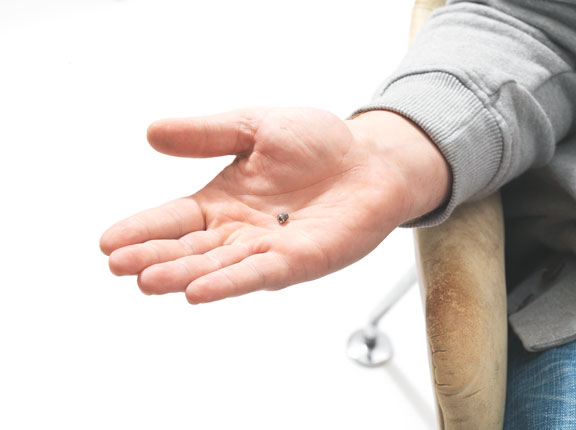
For that matter I would also suggest chipping kids until the age of 18 when they can decide for themselves whether to stay chipped or not. Why wouldn’t you want to be able to find out where your kids are just by using an app on your phone? No more Amber alerts!! No worries about where your kids are after midnight. There is a phone finder app that you could potentially use to find where your kids are but what if they turn it off or it gets turned off by someone or they simply leave their phone at home etc. No way to turn off the chip. You could get the kids a chipped bracelet or necklace but what’s wrong with putting it under the skin somewhere so they can never screw it up.
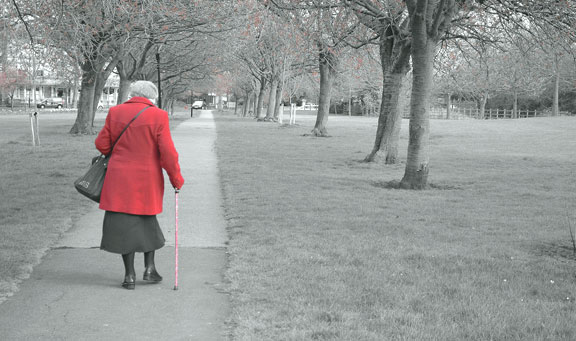
Let’s get back to Grandma … She’s living alone now and she is getting older and slower but wants to stay in her house. Maybe you have taken over paying the bills. Maybe you do the driving now. Who doesn’t worry about momma? Well, get her chipped and half your worries go away. You can be notified when she leaves the house. You can monitor her driving. You can check on her from across the country. Maybe you worry she will wander off. Maybe you got her the upgraded version that can alert you if she falls. There is a great system in CNY called Project Lifesaver International that can find a demented patient who wanders but you have to have the person wear a special device and you have to use a helicopter (or now perhaps a drone) to find the signal put out by the device. This is expensive but effective. Central New York has Ruth Hurd Boshart to thank for this service. She essentially single handedly spearheaded this program and is a testament to what one motivated individual can accomplish! Technology has advanced and I think we can do better. I don’t think there really is a chip to put in people yet but there should be and someone is going to make a big pile of money when they finally come to market.

How about an timely and local example? The great New York State Fair is this month and you know how crowded it can get … how easy it is to get separated from your loved ones. Maybe you have taken the Boy Scout troop or you brought a few of the neighbors kids with you. You turn your back for one minute and someone’s gone … Are they in the bathroom or in the trunk of some car? Are they at the petting zoo or are they scoring drugs off the carny? Pull out your phone … activate the app and there they are! It’s just a matter of time before someone puts this together and I predict it’s going to become universal! I know you worry about your “privacy” but you really don’t have any privacy anymore and I think the safety issue will win out and eventually you too will want to get chipped. If you just think about it for a while you will eventually agree with me that this is a good idea … and it’s ready for prime time … all it will take is one of you millennials to get this going … Don’t make me do ALL the work. Until next month … Get well and stay well.
Top 5 Risks for Seniors
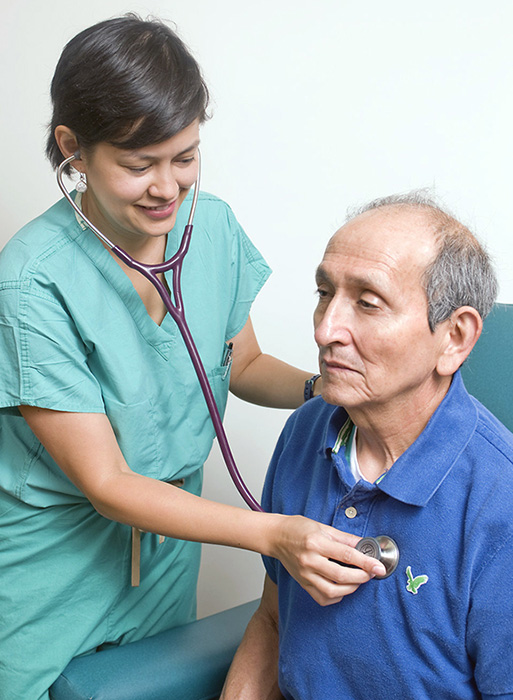
I gave a lecture recently regarding the top 5 health issues for seniors and I thought I would translate that into an article. (By the way if you have a group interested in hearing about medical issues contact my office and we’re happy to oblige if we can. I have a lot of information stored in the data banks and I’m happy to give it all at once to a group of people rather than one of the time in office calls. I don’t know if I will entertain you but I know I will educate you.)
The top 5 health dangers to seniors are pills/polypharmacy, falls, heart disease, cancer and dementia. Luckily, with each of these issues there are interventions. -Interventions that are patient based. Interventions that will save you money and make you healthier and that don’t require prescription medication.

Starting with polypharmacy … That’s defined as an increase in the number of medications or use of more medications than is medically necessary. Polypharmacy is common in ambulatory care, hospitals and in nursing homes. Polypharmacy increases the risk of practically everything. According to the NIH polypharmacy increases healthcare costs, increases side effects, increases medication noncompliance, worsens functional impairment, affects cognitive status, increases the risk of falls and incontinence. You can take action here. Carry a list of all your pills including supplements to all your doctor visits. Involve your doctor and your pharmacist in reviewing your list. Don’t to be afraid to challenge your doctor and ask questions. Know what pills you’re taking and why. The more meds you take more dangerous it is. Having practiced for almost 30 years I can tell you there are not a lot of doctors in Syracuse that are stopping pills and in fact only geriatric doctors are really trained to cut down the pills as age-appropriate. Just as an example if you are over the age of 76 and you have no history of heart disease the US Preventive Services Task Force in November 2016 concluded that “the current evidence is insufficient to assess the balance of benefits and harms of initiating statin used for the primary prevention cardiovascular events.” I have seen literally 100’s of people in their 80s with no inkling of heart disease or stroke who are taking a statin drug.

Next up is Falls. Falls are the leading cause of death by accidental injury among people who are older than 65. The average healthcare cost of a fall injury involving a person 72 years or older was 19,448 dollars in 1998 according to the NIH. Please don’t think it won’t happen to you. One fourth of Americans age 65 or older fall each year. Every 11 seconds an older adult dies from a fall. Falls are the leading cause of fatal injury and the most common cause of nonfatal trauma related hospital admissions among older adults. Again here as a place for you can take actions. You can clean up the clutter, repair or remove tripping hazards like rugs, install grab bars and handrails, appropriate lighting, shoes not socks, live on one level, wear an emergency alert type device. Be aware that your diabetic and blood pressure meds can increase falls. No matter how careful you are you will eventually fall and that’s why exercise is best protection against fall related injury. If you work on your balance actively and you work on keeping your muscles in tone then you’ll recover better faster etc. after the fall. The bottom line is that you’re going to fall, but the better you take care of yourself the better you will recover.
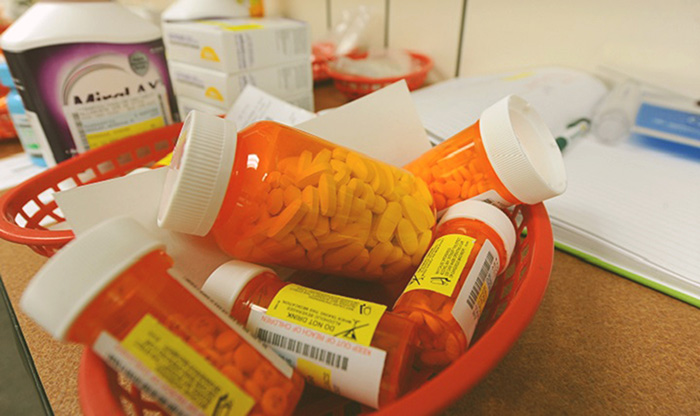
Of course we can’t forget about heart disease. It remains the #1 cause of death in America. Genetics, exercise, diabetes, blood pressure, smoking, diet, stress, age and cholesterol all play a role. Luckily except for genetics and age you can work on all those modifiable risk factors. Focusing on the basics of diet and exercise is available to everyone and anyone.
Likewise cancer remains a common killer. Cancer does not become less common as you get older. Treating cancer comes with a staggeringly high price tag. Preventing cancer does not. Again this is an area where very simple changes in your lifestyle can have a profound effect on your risk for cancer. Not smoking. Moderating alcohol. Increasing fruits and vegetables … the antioxidants. None of this is controversial. None of this requires a prescription from the doctor. Again you’re in the driver’s seat when it comes to your health heart wise and Cancer wise. The problem is most of you are unwilling or unable to turn the keys in the ignition and get started on your drive to healthy longevity land … and of course that’s the key. You don’t want to just grow old you want to grow old and remain healthy as possible. This does not come from a random act of kindness this comes from you putting in consistent sustained attention to your health.
Finally we come to dementia. Dementia, to me, seems much worse than cancer or heart disease because of how long it lasts and the effects it has not only on the patient but the caregiver. No one wants a heart attack but at least if you drop-dead your suffering is over quickly. Likewise no one wants a cancer but after whatever harrowing therapeutics are necessary you can hope to enjoy a quality of life again but with dementia it’s a never ending nightmare. The staggering financial costs related to dementia, which are certain to increase dramatically as the Silver Tsunami peaks, Pale in my mind in comparison to the psychological damage done by this process. As depressing as this subject is, and I find it profoundly depressing, there is action again you can take to attempt to prevent dementia. Keep your weight down because obesity is associated with dementia. Keep your sugars under control because diabetes is related to dementia. Get regular exercise because regular exercise is strongly inversely correlated with getting dementia. Don’t smoke and be moderate with alcohol. Control your blood pressure but don’t let it go so low that you get dizzy. Most important is exercise. Whether you can help yourself prevent dementia by engaging in new activities and mental challenges remains debatable but physical exercise has been studied in multiple trials and has a protective effect on the brain.
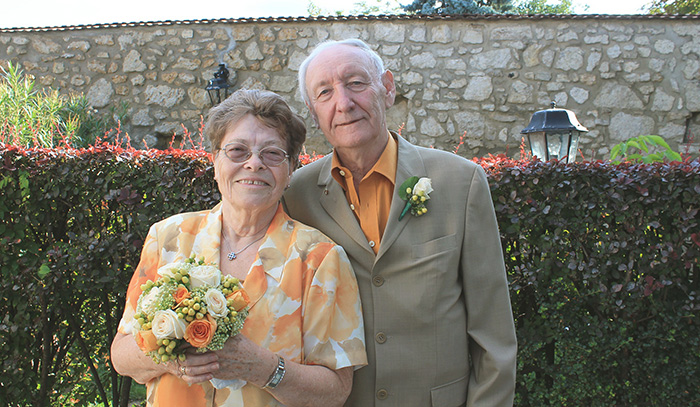
So there are multiple dangers ahead for seniors but luckily you can take action that improves your odds. Simple basic action like eating better and exercising etc. Even though I’m the doctor I find it heartening that you don’t have to come to me to make a big impact on your health. Take charge, take action and work on your health every day.
Fighting Fibromyalgia
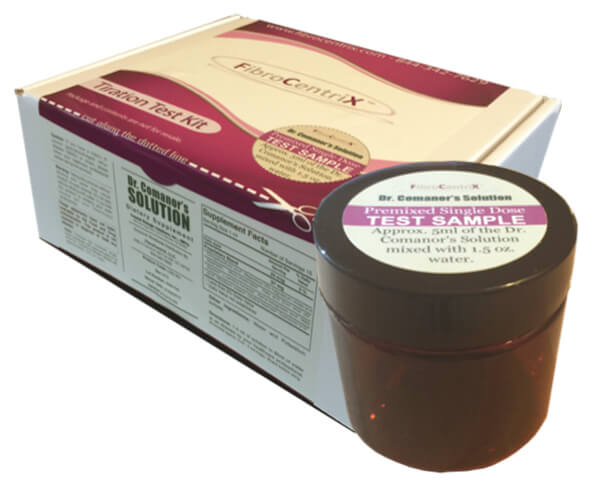
Last month I wrote about the manifest benefits of exercise. Right after I wrote the article there was yet another paper in the medical journals that further supported the evidence that regular exercise decreases cancer risk as well. Imagine that… a treatment that doesn’t involve tremendous expense, a treatment that doesn’t require special medicines… a treatment that doesn’t require a doctor’s supervision. We have no pill that lowers dementia risk, lowers cardiovascular risk and lowers risk of cancer all at the same time. Plus, you will actually feel better!!!
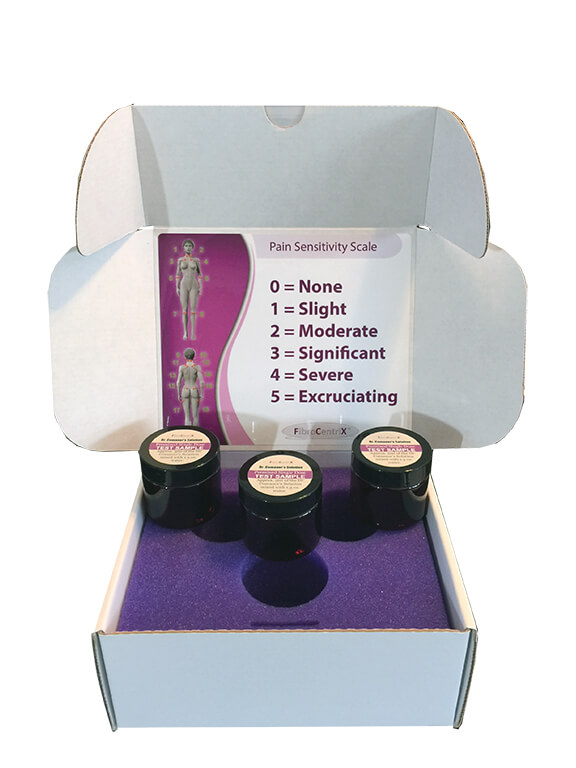
This month I want to focus again on something really new, at least for Syracuse. There is a new treatment for Fibromyalgia. Fibromyalgia as defined by the Mayo Clinic is “a disorder characterized by widespread musculoskeletal pain accompanied by fatigue, sleep, memory and mood issues.” We still don’t have a good handle on what causes fibromyalgia. Some doctors think it’s all just depression. Some doctors believe it is an infectious disease and we just haven’t found the causative organism yet. So far the treatments for fibromyalgia involve pain meds, antidepressants and seizure meds like lyrica and neurontin used for their pain relieving properties. Of course we advise all patients to try exercise but it’s tough to get people in pain at rest to really exert themselves. Genetics may play some role but it’s not a certainty. Women are affected more than men but we don’t really have a handle on why.
Other than prescription meds we have advocated meditation, tai chi, yoga, massage and acupuncture all of which have shown some improvement in symptoms over time. The prescription drugs don’t fix or cure anything they just help deal with the symptoms. Of course, the meds can cause their own symptoms and the patient is left trying to decide what’s worse, the disease or the treatment.
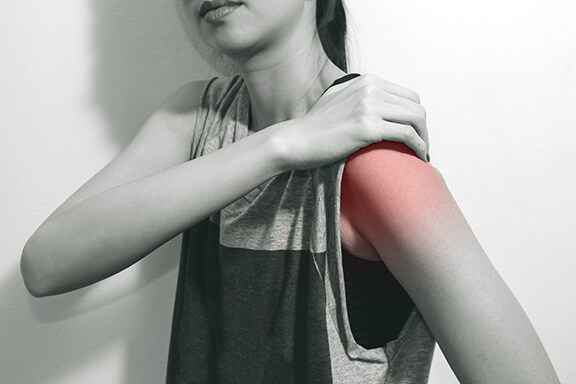
Now, however, there is something new. There is a company called Fibrocentix which offers a new patented treatment which is safe and effective for most patients and is also all natural. The company approached me about working with Fibro patients and since we don’t have any really good effective treatments I was all for trying it out. Any patient interested in the treatment gets seen by a trained specialist (not a nurse or doctor but someone with lots and lots of experience treating Fibro patients) for an educational and informational visit. At this visit the patient’s trigger points will be tested. Trigger point tenderness is one of the hallmarks of Fibro. Each patient after being evaluated is given a dose of the solution (it’s a liquid preparation) and can judge for themselves if it’s working. The visit and the trial of the medication is FREE. Thats right I used the F word. One of the reasons I was impressed with this company and its solution is that patients will know from the one free visit if the supplement works for them. YOU will be the judge of whether it works for you or not. If you get benefits from the supplement you take it for a few months and gradually wean off. If it doesn’t help… you do not proceed and keep looking for other solutions… it’s as straightforward as that! The solution is not guaranteed to work. I don’t think you can guarantee anything in the medical arena. I wouldn’t trust anyone that guarantees anything in medicine.

If you ask your doctor about this I expect that they will say… ”never heard of it.” If it’s not covered by insurance—and this treatment is not—doctors are not reading about it or being exposed to it. Insurance companies have to be dragged kicking and screaming to cover new meds, new FDA approved treatments, etc. -They sure are not going to warm up to the idea of covering an all natural patented supplement treatment. The insurance companies are not in charge of your health… you are. If you are in Fibro pain or know someone who is suffering from Fibromyalgia why wouldn’t you check this out. Since this doesn’t involve your insurance you don’t need a referral or anything like that. You can go to the web site and you will find a list of doctors who offer this treatment option and of course you can call us directly at 315-487-8109315-487-8109. You really have nothing to lose but possibly your pain !
Until next month… get well… stay well. JT BARRY MD
The Benefit of Exercise
I have written in the last year about interesting or exciting innovations like the Cognivue test which is the first and only FDA approved machine to test for dementia. I have written about the Pharmanex scanner to assess your nutritional / antioxidant status. I have written about the chronic care program sponsored by Medicare. These are all up-to-date, next generation/new wave issues but today I want to write about one of the bedrock issues of medicine which is the benefit of exercise. Everyone knows that exercise and eating right are good for you, in fact, it’s so well known that you spend very little time with your doctor discussing it. That’s a shame because the benefits are dramatic and sustainable and I think that the proof of this should be brought up on a regular basis.

We doctors have recommended a lot of things that in the end didn’t turn out to be true or meaningful. We told her to avoid eggs and that isn’t right. We told you to cut down the meat and the fats in your diet and that’s wrong as well. Years ago and still recently we said increase the carbohydrates in your diet and we know how wrong that is. We used to use leeches, we still do but in medically appropriate setting now. So If I’m going to recommend something I’d better back it up with up to date science.
Let’s start with exercise and dementia in the February 2017 Mayo Clinics proceedings they did a test of 6000 veterans to assess for exercise capacity and the association with dementia and cognitive impairment. The researchers found that “exercise capacity is strongly associated with cognitive function.“ The more you exercise the better your brain testing was. Since dementia is considered in some circles to be the #3 cause of death In America, this alone should be strong impetus to get on a good exercise program and to stay on it.
Another article from the Mayo Clinic from January 2017 assessed cardiovascular fitness and the likelihood of having an adverse cardiovascular event that is stroke or heart attack or sudden death. This test involved 20,000 US veterans more than half of whom are African-American. This study followed these men for 11 years. The research found that there was a very direct correlation between exercise capacity and adverse cardiovascular events. -The more fit you were the less likely a heart attack or stroke etc. The difference in mortality between the least fit and the most fit was quite dramatic.
Finally, the American Journal of medicine in 2016 published study that evaluated the impact of cardiorespiratory fitness levels on the risk of developing atherosclerosis -(hardening of the arteries). As you know the conventional wisdom is that the higher your cholesterol the more hardening of the arteries you’ll have. Hardening of the arteries leads to strokes and heart attack.
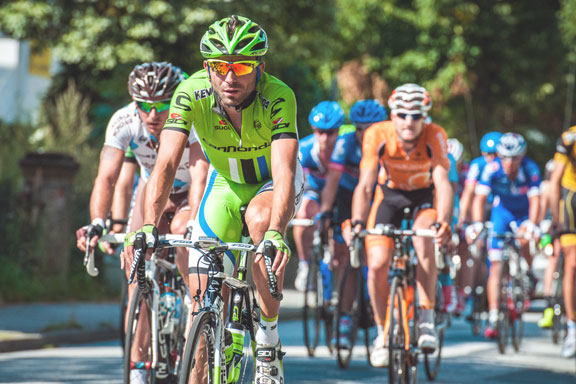
They basically followed people like myself with very high cholesterol levels who were also vigorous exercisers to see if the vigorous exercise could counteract the effects of the high cholesterol levels. They found, in fact, that if you had regular vigorous exercise it was amazingly protective of the heart despite the high cholesterol levels.
So, three articles published within the last year all confirm the various benefits of exercise. It protects the brain. It protects the heart. You don’t have to belong to a gym to get good exercise. Of course in this part of the country the other important thing to remember is that you have to weatherproof your exercise. So many people tell me that they don’t get out of the house much in the winter. Imagine leaving your car in the garage over the winter and trying to start it reliably come spring. There are many places like Destiny, Wal-Mart and Wegmans that have been enclosed areas you can walk in. Soon with Uber coming you won’t have any excuses left.
The great thing about exercise is it doesn’t really require prescription from the doctor. It doesn’t require special outfits. It doesn’t require special training places. It doesn’t require hours and hours of your time every day. You can do it alone or you can do it with other people. You can do it indoor or out. You can do it daytime or nighttime. There is no real reason that you can’t get started today to improve itself a little bit every day physically and for that matter mentally.
Next month we will again bring you something cutting edge, at least for Syracuse. Until then get well and stay well.
Is Alzheimer’s a Form of Diabetes? | March 2017
 Last month I got a little personal. This month I am taking you to the very cutting edge of scientific thought. There seems to be a real connection between diabetes and dementia. Someone coined the term that Diabetes Type 3. Until recently I had never heard this term. The contention is that Alzheimer’s Disease is really a brain form of diabetes. This is not really new info in the scientific community but it sure didn’t make it to the front line caregivers. The real culprit, as I understand it, is once again INSULIN. Simplistically Type 1 diabetics have no insulin and need to take shots of insulin to control their blood sugar. Insulin is a growth hormone that pushes the sugar in your bloodstream into the individual cells where they can be used. Type 2 diabetics don’t respond as well or strongly to the high sugar in your blood so it takes more insulin than normal to get the sugars into cells. This is called insulin resistance. Type 3 diabetes appears to be abnormal insulin effects in the brain resulting in histochemical and pathological changes identical to those found in Alzheimer’s brains. This is big big news which appears to be based on pretty good scientific underpinnings. The idea that Alzheimer’s is a form of diabetes has been around since 2005. Roughly one third of Americans have diabetes. Diabetes and dementia are both epidemic in this country and increasing over time. It has been known for some time that diabetic patients are 2-4 times as likely to become demented as those who are not diabetic. Besides telling the bodies cells to take in sugar, Insulin also tells fat cells to grow. If you are Insulin resistant, which the vast majority of Type 2 diabetics are , you have higher amounts of insulin in your bloodstream to keep your sugars under control. This same higher insulin level makes losing weight very difficult because insulin puts your body in growth mode not weight loss mode. You need insulin to live but you want to get away with as little as possible.
Last month I got a little personal. This month I am taking you to the very cutting edge of scientific thought. There seems to be a real connection between diabetes and dementia. Someone coined the term that Diabetes Type 3. Until recently I had never heard this term. The contention is that Alzheimer’s Disease is really a brain form of diabetes. This is not really new info in the scientific community but it sure didn’t make it to the front line caregivers. The real culprit, as I understand it, is once again INSULIN. Simplistically Type 1 diabetics have no insulin and need to take shots of insulin to control their blood sugar. Insulin is a growth hormone that pushes the sugar in your bloodstream into the individual cells where they can be used. Type 2 diabetics don’t respond as well or strongly to the high sugar in your blood so it takes more insulin than normal to get the sugars into cells. This is called insulin resistance. Type 3 diabetes appears to be abnormal insulin effects in the brain resulting in histochemical and pathological changes identical to those found in Alzheimer’s brains. This is big big news which appears to be based on pretty good scientific underpinnings. The idea that Alzheimer’s is a form of diabetes has been around since 2005. Roughly one third of Americans have diabetes. Diabetes and dementia are both epidemic in this country and increasing over time. It has been known for some time that diabetic patients are 2-4 times as likely to become demented as those who are not diabetic. Besides telling the bodies cells to take in sugar, Insulin also tells fat cells to grow. If you are Insulin resistant, which the vast majority of Type 2 diabetics are , you have higher amounts of insulin in your bloodstream to keep your sugars under control. This same higher insulin level makes losing weight very difficult because insulin puts your body in growth mode not weight loss mode. You need insulin to live but you want to get away with as little as possible.
Suzanne de la Monte a neuropathologist at Brown University did rat research that showed when she blocked insulin to the rats brains they acted demented and their brains showed “all the signs of Alzheimer’s”.
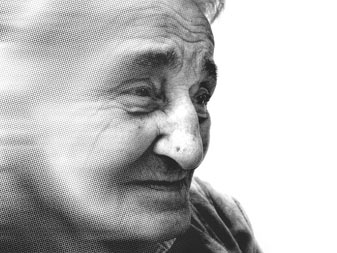 Shall we get more technical? In the Journal of Diabetes Science and Technology published November 2008 experts reviewed the evidence regarding this possible connection and found “extensive disturbances in brain insulin and insulin like growth factor (IGF) signaling mechanisms represent early and progressive abnormalities and could account for the majority of molecular, biochemical, and histopathological lesions found in Alzheimer’s Disease. “ Furthermore , when they experimentally induced brain diabetes these rats brains shared many features with Alzheimer’s and when they treated these rats with currently used insulin sensitizers the changes were reversible. Now we are not rats and many times what’s true in rats and mice does not translate to humans but it’s a pretty strong chain of evidence nonetheless.
Shall we get more technical? In the Journal of Diabetes Science and Technology published November 2008 experts reviewed the evidence regarding this possible connection and found “extensive disturbances in brain insulin and insulin like growth factor (IGF) signaling mechanisms represent early and progressive abnormalities and could account for the majority of molecular, biochemical, and histopathological lesions found in Alzheimer’s Disease. “ Furthermore , when they experimentally induced brain diabetes these rats brains shared many features with Alzheimer’s and when they treated these rats with currently used insulin sensitizers the changes were reversible. Now we are not rats and many times what’s true in rats and mice does not translate to humans but it’s a pretty strong chain of evidence nonetheless.
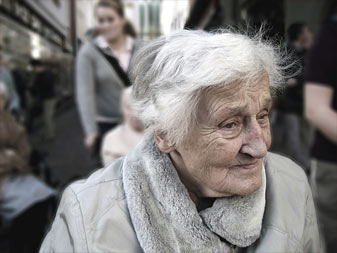 Shall we talk numbers? According to an article in the NY Times…Diabetes and Dementia have nearly tripled in the US in the last 40 years. Both Diabetes and Dementia are separately listed among the top ten causes of death in America today. Currently 2 % of Americans have dementia…that’s over 5 million people and dementia costs our healthcare system 200 billion dollars. Add the cost of Dementia care and the cost of Diabetic care and you are talking some real money and a real impact on the health care system.
Shall we talk numbers? According to an article in the NY Times…Diabetes and Dementia have nearly tripled in the US in the last 40 years. Both Diabetes and Dementia are separately listed among the top ten causes of death in America today. Currently 2 % of Americans have dementia…that’s over 5 million people and dementia costs our healthcare system 200 billion dollars. Add the cost of Dementia care and the cost of Diabetic care and you are talking some real money and a real impact on the health care system.
For further reading check out the well known Dr. David Perlmutter’s book Grain Brain.
The most important finding in all this is that Alzheimer’s is no longer just a “condition that befalls us by chance.” You might be able to dramatically decrease your risk of dementia with your diet and exercise program. No fancy medications, no special treatments. The same diet that can improve your brain is the very same diet that improves your heart, your waistline, and your liver….so now what’s stopping you ! Next month we finally take on the supplement industry with hard science and new technology. Stay tuned…until next month…get well and stay well. Jtb
